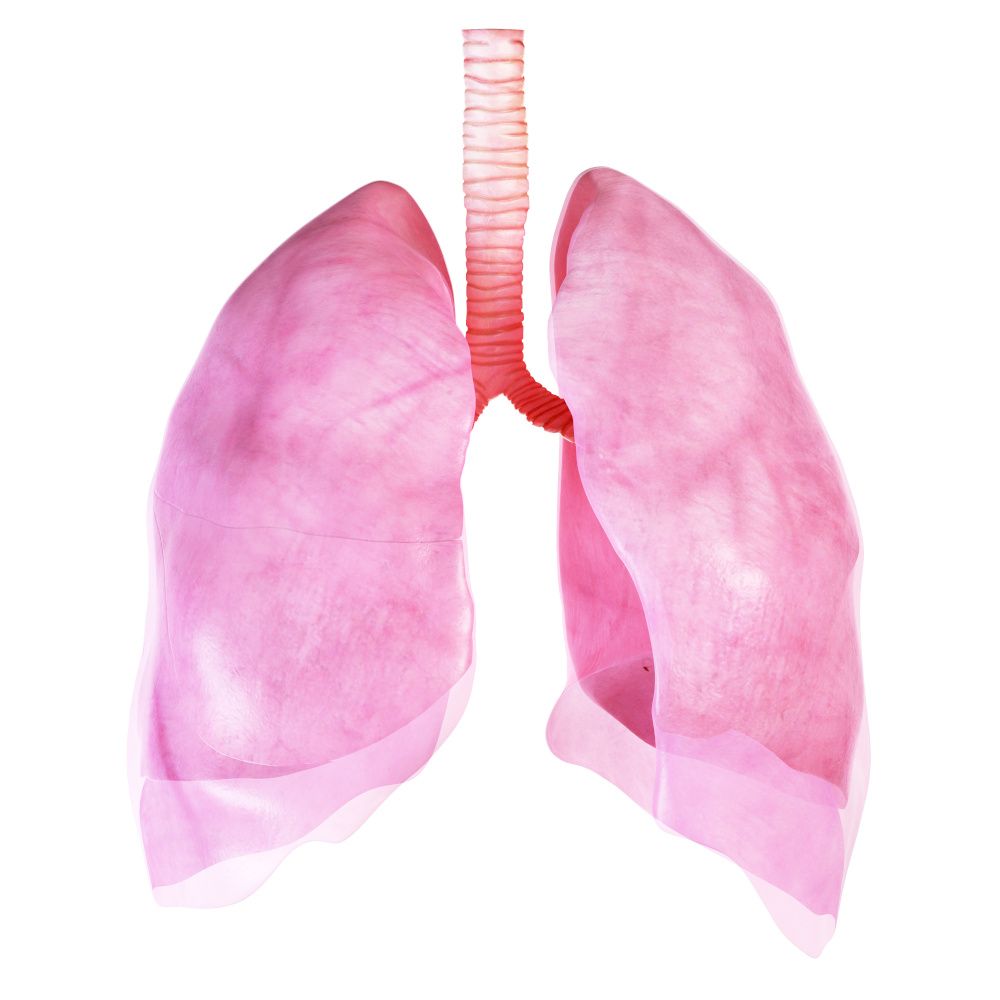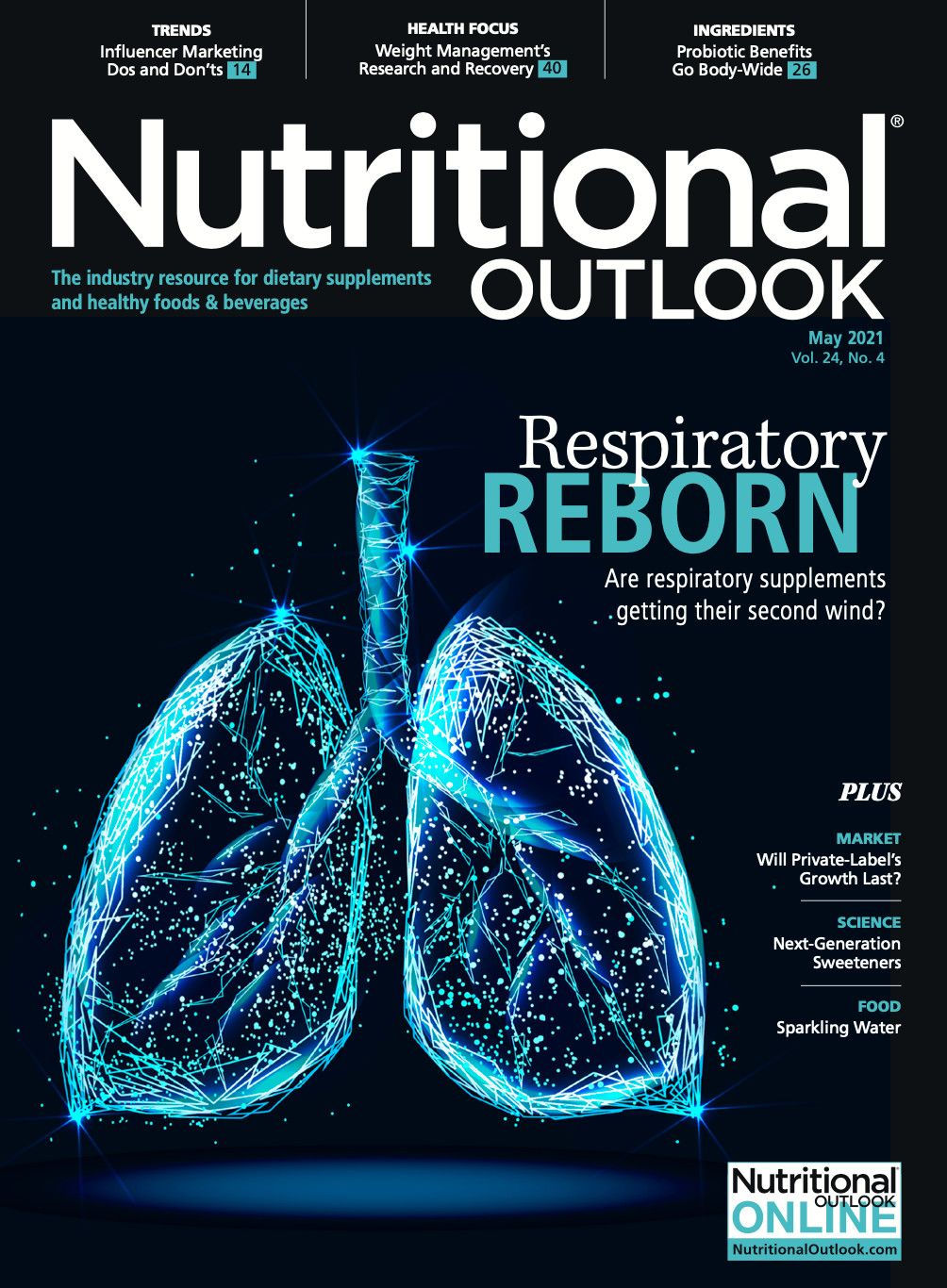Respiratory health: Can nutritional ingredients breathe life into the respiratory category?
There’s renewed interest in respiratory-support ingredients. What’s in the toolbox, and do they work?
Photo © AdobeStock.com/SciePro

These days, when it comes to our health, the news is rightly centered around the COVID-19 vaccine rollout, signaling hope that the pandemic may soon be in our rearview mirrors. And while the vaccines are a breath of fresh air for the world’s population, responsible companies focused on the respiratory health category for dietary supplements are properly focused in areas where they can more appropriately—and legally—market their products.
Although breathing issues are one of the most frightening aspects associated with the coronavirus pandemic—and responsible supplement companies understand that’s not a field they can play on—the fact is that, the pandemic aside, there are many other conditions that impact respiratory health.
According to the American Academy of Allergy, Asthma & Immunology, between 10% and 30% of the global adult population (ages 18+) suffer from allergic rhinitis, commonly known as hay fever.1 Sinusitis develops in an estimated 31 million Americans annually.2 The World Health Organization estimates more than 339 million people worldwide have asthma.3
Sabinsa’s (East Windsor, NJ) President Worldwide Shaheen Majeed notes that in addition to allergies and infections, “We are continually being exposed to environmental pollutants.” He adds, “Our lungs and the respiratory system are constantly working to keep us alive and active. Eating healthy, maintaining a good BMI and an active lifestyle, and regular breathing exercises can all add to the functional improvement in respiratory health.”
If COVID-19 can be considered to have done anything positive, it’s that the ravages of the disease have pushed people to focus on the importance of taking care of their health, including how to protect their immune function. There’s a strong connection between the body’s immune and respiratory systems, and the two continuously intertwine.
Susan E. Hirsch, MS, CNS, formulation manager, Gaia Herbs, explains, “While the lungs are the main part of the respiratory system, this system is complex. The upper respiratory tract includes the mouth and nose, nasal cavity, throat, and voice box. The lower respiratory tract includes the lungs, trachea, bronchi, bronchioles, and alveoli. The respiratory system affects every aspect of our bodies and health, and a lot of systems play a role in keeping the lungs and respiratory system healthy.”
Dietary Ingredients for Respiratory Health
“Dietary supplement ingredients can support respiratory health in multiple ways, such as decreasing inflammation triggered by an allergen,” says pharmacist and author David J. Foreman, RPh, ND. There’s also a role, he advises, for dietary supplement ingredients in decreasing histamine release; thinning mucus secretions (because excess or thick mucus can lead to infections, congestion, and more); relaxing the smooth muscles of the bronchioles, the small air passages inside the lungs that deliver air to the alveoli sacs where oxygen and carbon dioxide are exchanged; and soothing irritated membranes such as lungs and sinus passages.
Sabinsa’s Majeed, like Foreman, takes a holistic approach to respiratory health. He says that when it comes to interventions and respiratory health, “diet and nutrition are modifiable risk factors for the management of respiratory diseases such as asthma, chronic obstructive pulmonary disease (COPD), and seasonal allergies.”
Majeed points to low levels of vitamin D as a risk factor for allergies, asthma, and respiratory infections. Foreman concurs. “I feel like a broken record, because vitamin D keeps coming up as a possible solution to many of the conditions we face. What I would like to see is more blood level testing and then specific doses based on a person’s results, race, and lifestyle.”
The Connection Between the Microbiome and Respiratory Health
“The microbiome,” according to Foreman, who is known in the industry as “The Herbal Pharmacist,” is another area where we need to look for more studies and use in respiratory health combination products.”
According to Foreman, research is beginning to show that taking probiotics might help reduce respiratory infections and sinusitis4 and decrease common cold.4,5
Justin Green, PhD, director of scientific affairs, Cargill Health Technologies (Minneapolis), is all for the science. His company’s postbiotic ingredient, EpiCor, acquired in 2018 from Embria Health Sciences as part of Cargill’s acquisition of Diamond V, has been on the market since 2006 and, according to Green, has a healthy portfolio of science backing up what he calls a “one-of-a-kind ingredient inspired by a real-life health discovery story.”
Packed into EpiCor’s rich science-based history, more than a dozen published studies demonstrate the ingredient’s health benefits, including supporting the immune system and beneficially modulating the gut microbiota, Green says. “Among the findings,” he claims, “these studies show EpiCor supports year-round respiratory and sinus health. In addition, EpiCor optimizes immune defenses to face daily challenges and maintain healthy gut function.”
As an example, a 12-week, randomized, double-blinded, placebo-controlled trial used subjects that tested positive for grass allergies. A total of 78 subjects completed the study, with several positive conclusions, including significant reduction of nasal congestion severity and duration in the EpiCor versus placebo groups during the high-pollen-count period. In addition, the largest symptomatic impact was seen on nasal congestion, with EpiCor having a 43% reduction in the median number of days with nasal congestion (16.5 days) versus placebo (29 days).6
Green notes that, traditionally, supplements were the key vehicle for postbiotics, but given consumers’ increased interest in obtaining their health benefits through functional food and beverages, his company is partnering with food and beverage makers to develop delivery methods for EpiCor in chocolate bites, granola bars, gummies, dispersible powdered drink sticks, and more.
Black Seed Breathing Benefits
Foreman says that “Some clinical research shows that taking black seed extract for three months can improve symptoms such as wheezing and coughing compared to placebo in patients with moderate to severe asthma who already take conventional asthma medication.”7
Majeed points out another study8—this one in vitro—with promising news for his company’s Nigellin Black Cumin Seed Extract. The findings identified the ability of Nigella sativa (also known as black seed or black cumin seed) to “suppress the release of the most active cytokines and identified a prostanoid with inflammatory properties which may possess a favorable effect in the context of asthmatic conditions,” according to a company press release. The study researchers evaluated 10 Nigella sativa extracts, and Sabinsa’s ingredient ranked on top in terms of the active constituent thymoquinone, the company adds.9
Majeed explains the multiple mechanisms of action that may enable black cumin seed extract to potentially help asthma sufferers. “Asthma is a chronic inflammatory disease of the airways, with the involvement of various inflammatory cells like mast cells, eosinophils, T lymphocytes, macrophages, and neutrophils.”
He continues, “Black cumin seed extract contains the active constituents thymoquinone and thymohydroquinone, which are flavonoids with antioxidant and anti-inflammatory properties. Thymoquinone suppresses the production of leukotriene B4, thromboxane B2, and inflammatory mediators. Black cumin seed extract exhibits spasmolytic and bronchodilator activities mediated through the blockade of calcium channels. The extract significantly decreases airway hyperresponsiveness by reducing the infiltration of asthma-related inflammatory cells in lungs and by reducing interleukin 4 (IL-4) and nitric oxide (NO) production.”
Gaia’s Hirsch also speaks to the complexities of herbs, explaining they do not have just one action in the body. “They wear many different hats,” she says, “and contain different compounds that are balancing to different constitutions.” Her company wants consumers to be aware that, as she says, “some herbs may work better for some people than others based on their individual constitutions. We advise people to listen to their body and to work with a health practitioner who is trained in herbs for the best results.”
Gaia Herbs introduced a new line of plant-based respiratory health–supportive products last November, including three products: Mighty Lung, Sinus Comfort, and Black Seed Oil. With regard to the latter, Hirsh says, “This herb has a long tradition of use for supporting respiratory function, as well as a small number of clinical studies that also support this.”10
Pycnogenol’s Potential Promise for Respiratory Health
Foreman also sees potential for French maritime pine bark extract, branded Pycnogenol, for asthma sufferers. He advises that “Three small clinical studies show that taking a standardized extract of maritime pine bark (1 mg/lb body weight or 100 mg daily) in addition to conventional asthma medications increased peak expiratory flow, decreased asthma symptoms, and decreased the need for rescue medications in children and adults with asthma of varying severity.11,12,13
Franziska Weichmann, manager of scientific communications and product development for Pycnogenol maker Horphag Research (Hoboken, NJ), says, “Our flagship ingredient, Pycnogenol French maritime pine bark extract, is shown to have histamine-inhibiting effects due to its ability to help modulate the inflammatory response, making it a great natural option for respiratory health.”
She points out that Pycnogenol originates from a unique source, a forest of mono-species pine trees grown exclusively in the Landes de Gascogne forest in southwest France. The patent-protected ingredient benefits from 40 years of research, including more than 450 scientific publications and 160 clinical trials on more than 12,000 subjects, according to Weichmann.
“Consumers are taking a more proactive approach to health and wellness,” says Weichmann. “With the heightened interest in respiratory-support products overall, Pycnogenol finished products continue to receive high demand, as consumers are seeking natural products that support overall health and are spending more time researching evidence-based, safe products and ingredients to meet their health needs.”
Other Ingredients to Buzz About
PLT Health Solutions (Morristown, NJ) has two branded ingredients for respiratory health with some interesting science and buzz. The company’s focus in this category is currently aligned around upper respiratory tract infections and anti-inflammatory support that relates to a broad range of factors under respiratory health.
Promunel Ultra Performance Propolis, launched in November 202014, combines, as the company’s tagline15 suggests, “a traditional ingredient made better by modern science.” Propolis is a resinous substance produced by honeybees as they gather pollen from trees and other botanical sources. The bees use it as a sealant to protect their hives, given that it provides antifungal and antibacterial properties to the nest.
As it turns out, it’s those same health-promoting properties that are the basis for Promunel’s benefits for humans. In a company press release14 announcing the launch of the branded ingredient, Jeremy Appleton, ND, director of medical and scientific affairs, PLT Health Solutions, said, “Propolis has been used medically since antiquity, and numerous mechanisms of action are well established in the literature, particularly regarding the individual polyphenols to which Promunel is standardized.”
Appleton said it was important to his company to have research that complemented the long history of use, conducted specifically on its branded ingredient. He reported that a randomized, double-blind, placebo-controlled clinical trial was recently published in Phytomedicine validating Promunel’s efficacy for upper respiratory tract health by showing “that Promunel cut two days off recovery time.”16
Specifically, the study was conducted on 122 adults with mild upper respiratory tract infections. Participants used either a Promunel oral spray or a matching placebo three times per day. A wide range of symptoms were evaluated, including sore throat, hoarseness, swelling, and redness.
For the group taking Promunel, 83% saw a remission of all symptoms after three days of use compared to the 72% of subjects in the placebo group who had at least one remaining symptom. And the healing took place in the Promunel population two days earlier than the five days recorded in the control group.
One more cool factor: The bees are part of the team. PLT’s partner in this innovative ingredient is the B Natural company (Corbetta, Italy), and according to the launch press release, B Natural has a “contract with the bees” to “go the extra mile to defend their colonies” by not over-sourcing and by “providing healthy environments, free of pesticides and other contaminants.”14
AlvioLife is PLT’s other branded ingredient designed to support respiratory health. It is a proprietary composition of extracts of Boswellia serrata gum resin and quince (Aegle marmelos) dried fruit.
According to Steve Fink, vice president of marketing, PLT Health Solutions, “The anti-inflammatory effects of acetyl-11-keto-beta-boswellic acid (AKBA) from Boswellia serrata are well known, having been shown in multiple clinical studies to provide 5-lipoxygenase (5-LOX) inhibition in people. The 1:1 ratio of Boswellia and quince fruit extract was shown in the AlvioLife clinical study to possess stronger 5-LOX inhibition activity better than either extract alone.”
The Complications of DSHEA
Foreman, The Herbal Pharmacist, says other ingredients with potential support for respiratory conditions such as bronchitis are NAC (N-acetyl cysteine) and English Ivy extract. Moreover, he would like to see more research with specific targets of COPD and asthma. “These are two huge areas of concern and cost the modern medical institutions billions of dollars annually,” he says.
But as dietary supplement companies are well aware, what the science suggests the product can do, and what can be legally communicated to consumers, can be two different things.
When it comes to respiratory conditions, history of use, some science, and calls for more science suggest that a number of dietary ingredients could be considered helpful for providing some relief. Certainly, the statistics for hay fever, sinusitis, and asthma sufferers point to the need for products that can help reduce the symptoms associated with respiratory conditions, such as inflammation. But even inflammation creates a tricky position when it comes to claims for dietary supplements.
Attorney Katie Bond, JD, partner at Lathrop GPM (Washington, DC), underscores the fact that there are inflammation claims that would be considered truthful, but according to FDA’s most recent thinking on the subject might not be allowable. Although she’s not advocating for this position, Bond says, “It might at some point come down to companies being willing to sue the agency.”
Bond explains, “There are plenty of newer companies in this industry who are consistently surprised when a truthful claim is not allowable.” She explains that when a study is conducted on a diseased population, “the endpoints of the study may not fit the regulatory guidelines that allow them to be used in structure-function claims, even if they’re truthful.” That’s a difficult thing for some companies to swallow.
Companies are understandably expected to support more science, but under the Dietary Supplement Health and Education Act (DSHEA) are not always allowed to communicate the results of that science in marketing or label claims. “A lot of the science is conducted in disease states; then you have to reword the results to make the language allowable from a legal standpoint. That’s complicated,” says Bond.
That’s the state of where the industry is regulation-wise.
And while companies flirt from time to time with opening up DSHEA, no one has officially pulled the proverbial trigger yet, with some perhaps believing the devil you know is better than the devil you don’t.
For some companies, there’s great appeal in the Natural and Non-Prescription Health Products Directorate, the Health Canada regulatory system.17
For example, PLT Health Solutions recently received a license from that regulatory body to market AlvioLife in Canada for support of respiratory health. According to a company press release, the approved claims include: 1) “AlvioLife helps to support lower respiratory tract health,” and 2) “AlvioLife helps to support lower respiratory tract health that includes the bronchial tubes and the lungs’ health.”18
PLT’s Fink says that recognition by Health Canada for AlvioLife reflects positively on the science that supports the ingredient. “Not only does the granting of this license open up the Canadian market for us, but it tells formulators around the world that a prestigious regulatory body respects our scientific support,” he says.
Bond advises that the Canadian regulatory system has some pros, but also some cons. On the upside, she says, “There’s a little more assurance on what’s allowed when it comes to claims, and that allows a company to communicate more specifically with its consumers. The flip side of the coin is companies have to wait for approval, which can interfere with business fluidity.”
Under DSHEA, Bond says, “Having a system where not having a preapproval process can be helpful in terms of getting the product to market, but the downside there is that the consumer may not understand what the science says the product does.”
Or even what the product is for.
Gaia’s Hirsch says that ever since three of the company’s new respiratory-support products launched in November on its direct-to-consumer website, gaiaherbs.com, sales have been strong through that channel. Black Seed Oil, however, wasn’t quite as popular as the other two new products, Mighty Lungs and Sinus Comfort, a factor potentially attributed to two things, says Hirsch. Black Seed Oil’s product name doesn’t make it easy for customers to know what specific condition the product is formulated for. In addition, she says, while Black Seed Oil is “well known and used regularly in the Middle East and India to support respiratory health, this herb is not currently well recognized in the U.S. as a respiratory health–supportive herb.”
Although it’s still early to determine the staying power of the new respiratory-support products, Hirsch adds that “these new products have been well received by all of our retailers, with product acceptance rates and shelf placement tracking above average as compared to our typical new product launches.”
Marketing on the Right Side of Regulations
Consumer fear of the coronavirus may have pumped blood into the hearts of certain dietary ingredient product categories as consumers sought to protect their general health—and, more specifically, support their immune function. But dietary supplement manufacturers are well aware of the illegalities of selling products associated with coronavirus claims or even implied coronavirus claims. If not, they should be.
Regulatory and legal expert Bond, who was with Amin Talati Wasserman before joining Lathrop in January, has substantial experience representing clients in a range of industries, including those in dietary supplements and conventional food. She has a heads up for companies marketing products for respiratory health: Don’t take chances with claims for this category. In other words, don’t step too close to the regulatory line.
“In my view, it would be hard for a regulator to argue that ‘respiratory support’ alone conveys anything necessarily about a disease,” she says, as she considers that to be a pretty vague claim. “It’s probably not very risky.”
What does concern Bond, however, would be claims, both for the immune and respiratory categories, that would slip into shades of referencing COVID-19 “even in an oblique way that would up the ante pretty quickly, just given the link between” respiratory ailments and COVID.
She points out that while products specifically focused on respiratory health may be closest to the “immune support” category, the latter has been tested and is, at this point, a far more popular claim to make than those claims for respiratory health.
“At the time when FTC was going after Airborne and [it] went after all the store brand versions of Airborne for their cold-prevention claims, the FTC made it clear that ‘immune support’ was not going to be held to the same standard as a preventative or treatment type claim for cold or flu,” she explains. “In the FTC’s view, the ‘immune support’ claim was more vague and unlikely to convey a disease-like claim that would be held to a higher substantiation standard. So, that sort of created that safe harbor for ‘immune support’ that ‘respiratory support’ doesn’t necessarily have.”
Not that she’s seen these examples, but it’s possible that it’s not just the obvious link like “wear your mask and take our supplement” that could serve as a red flag. Bond points out that even adding the word “now” to a claim—as in “support your respiratory health now”—could raise regulators’ eyebrows. “That risk will, of course, increase,” she advises, “as the likelihood of implying COVID-19 benefits increases.”
Importantly, companies are responsible for implied claims, not just those stated outright. “If regulators can argue successfully that even just 15% or 20% of reasonable consumers would take away a certain message,” says Bond, “then the company is responsible for the truthfulness of that message.”
This is neither the time nor the category to take unnecessary risks. Says Bond, “There are lots of eyes on the entire immune-supplement category at this point. I think most companies are doing the right thing and staying on the right side of the law.”
She believes there is a real place for responsible industry to serve consumers interested in staying healthy; however, making claims or producing ads with connections to COVID is not the right move.
It’s not surprising that Bond recommends companies “talk to your legal team early in building your ad campaigns.” But it is a smart reminder. Says Bond, “There are still ways to build that marketing-legal synergy and innovate in a low-risk way during the pandemic.”
References
- “Allergy Statistics.” American Academy of Allergy, Asthma, and Immunology website. Accessed here.
- “Allergy Statistics.” The Asthma & Allergy Center website. Accessed here.
- “Asthma.” World Health Organization website. Updated May 20, 2020. Accessed here.
- Hao Q et al. “Probiotics for preventing acute upper respiratory tract infections.” The Cochrane Database of Systematic Reviews, no. 9 (February 3, 2015). Accessed here.
- Leyer GJ et al. “Probiotic effects on cold and influenza-like symptom incidence and duration in children.” Pediatrics, vol. 124, no. 2 (August 2009): 172-179
- Moyad MA et al. “Immunogenic yeast-based fermentation product reduces allergic rhinitis-induced nasal congestion: a randomized, double-blind, placebo-controlled trial.” Advances in Therapy, vol. 26, no. 8 (August 2009): 795-804
- Boskabady MH et al. “The possible prophylactic effect of Nigella sativa seed extract in asthmatic patients.” Fundamental & Clinical Pharmacology, vol. 21, no. 5 (October 2007): 559-566
- Koshak AE et al. “Comparative immunomodulatory activity of Nigella sativa L. preparations on proinflammatory mediators: a focus on asthma.” Frontiers in Pharmacology. Publishedonline October 2, 2018. Accessed here.
- Press release. “Sabinsa’s Nigellin™ Black Cumin Seed Extract Identified as a Potent Favorable Immunomodulation in Asthma Inflammation.” Issued December 3, 2018. Accessed here.
- Koshak A et al. “Medicinal benefits of Nigella sativa in bronchial asthma: A literature review.” Saudi Pharmaceutical Journal, vol. 25, no. 8 (December 2017): 1130-1136. Accessed here.
- Lau BHS et al. “Pycnogenol as an adjunct in the management of childhood asthma.” The Journal of Asthma, vol. 41, no. 8 (2004): 825-832
- Hosseini S et al. “Pycnogenol((R)) in the management of asthma.” Journal of Medicinal Food, vol. 4, no. 4 (Winter 2001): 201-209
- Belcaro G et al. “Pycnogenol(R) improvements in asthma management.” Panminerva Medica, vol. 53, suppl. 3 (September 2011): 57-64
- Press Release. “PLT Launches Promunel™ Ultra Performance Propolis.” Issued November 18, 2020. Accessed here.
- “Respiratory Health.” PLT Health Solutions website. Accessed here.
- Esposito C et al. “A standardized polyphenol mixture extracted from poplar-type propolis for remission of symptoms of uncomplicated upper respiratory tract infection (URTI): a monocentric, randomized, double-blind, placebo-controlled clinical trial.” Phytomedicine. Published online October 8, 2020.
- Government of Canada website. Natural and Non-Prescription Health Products Directorate. Accessed here.
- Press release. “PLT Health Solutions Receives License for Respiratory Support Ingredient from Health Canada.” Issued August 31, 2020. Accessed here.

Prinova acquires Aplinova to further increase its footprint in Latin America
April 7th 2025Prinova has recently announced the acquisition of Brazilian ingredients distributor Aplinova, which is a provider of specialty ingredients for a range of market segments that include food, beverage, supplements, and personal care.




















